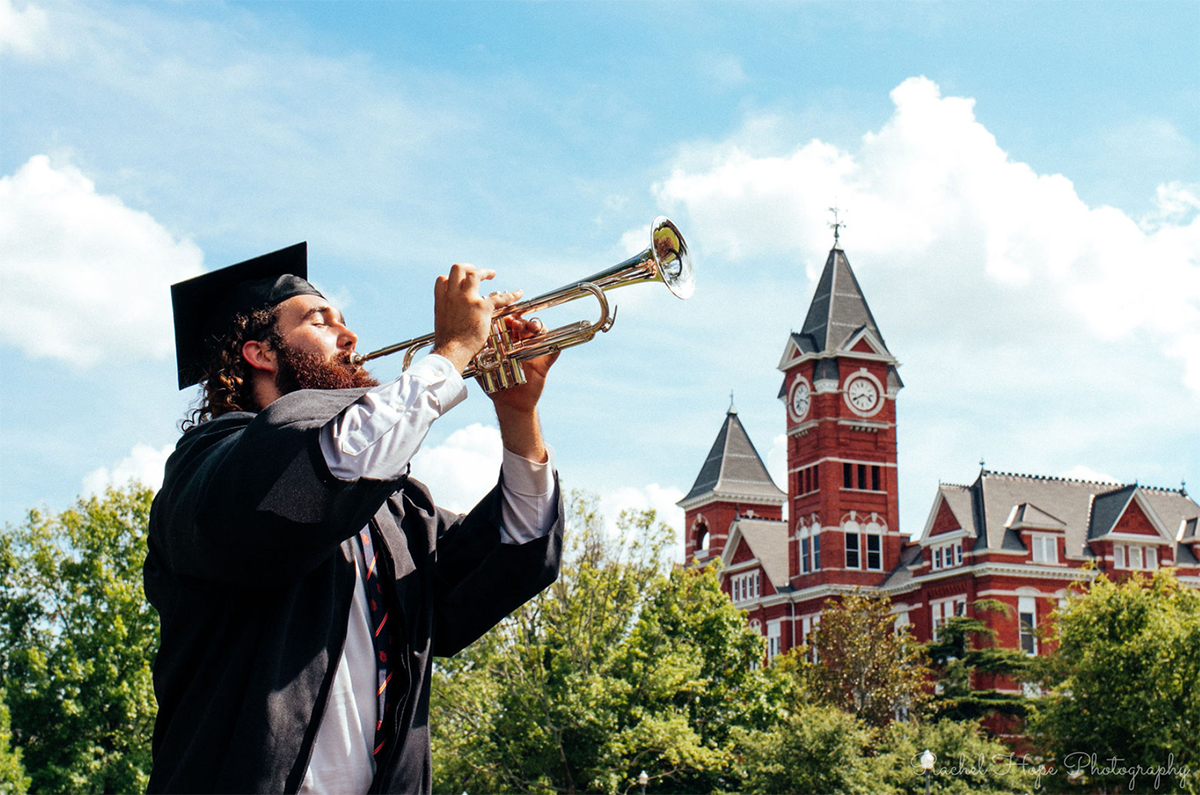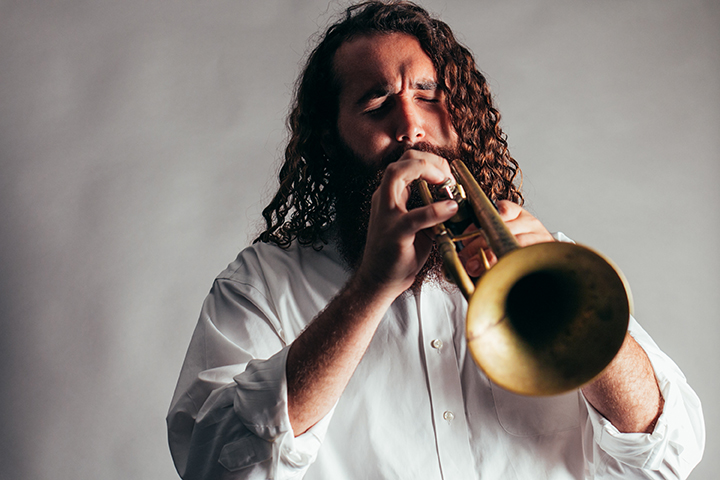Wilson Childers ’20 went from aspiring engineer to Juilliard trumpeter in short measure.
By Caroline Rice

Standing 6 feet 2 inches tall, with flowing brown curls and a “glorious beard,” Wilson Childers has the look of a well-traveled musician. But after a year at the Juilliard School of Music in New York City, he’s still adjusting to taking the subway to class instead of Tiger Transit.
As an underclassman at Auburn, he never dreamed he would attend the most prestigious music school in the world to earn a master’s degree in music.
For more than a year, he was an engineering student.
Having a knack for math and science, Childers made the easy decision to follow in his father’s footsteps and become an engineer. He dove headfirst into the Samuel Ginn College of Engineering but, unwilling to give up his passion for music, still played his trumpet in the Auburn University Marching Band and Symphonic Winds.
By his sophomore year, Childers felt the pull between the rigorous engineering courses and his increasing musical passion. He saw that his gift of problem-solving could be used in his musical interpretation, trumpet technique and repertoire building.
Engineering couldn’t provide the same spark in him that music did.
“I didn’t hate my engineering classes,” Childers said. “I just loved music more.”
Mark DeGoti, a professor of trumpet at Auburn for 11 years, knew Childers was different the moment he entered the doors of Goodwin Hall as an engineering student.
“Musical expression is hard to teach, and Childers had that from the beginning,” DeGoti said.
During one of Childers’ first recitals at Auburn, DeGoti noticed his student wearing blue alligator skin dress shoes—a bold statement that reflected Childers’ personality.
“Wilson is Wilson—he has long, flowing hair, a glorious beard and blue dress shoes, and that captures his uniqueness as a musician,” DeGoti said.
Set on shifting Childers toward a career in music, DeGoti and Rick Good, the director of bands at Auburn, introduced him to internationally acclaimed trumpeters who also saw glimpses of the musical engineer’s talent.
During his sophomore year at Auburn, Childers changed his major from engineering to music performance and felt an immediate wave of excitement—followed by gripping fear.
“As an engineer, you have job security and a decent salary. With music, there are no guarantees,” Childers said.
Despite the leap of faith, he hasn’t regretted a single day of chasing his love for music. Instead, he embraced the challenge. In applying to six graduate school programs, Childers was advised to shoot for the stars.
“If you’re going to apply for a music school, you might as well shoot for Juilliard and see what happens.”

Childers received scholarship money from each school he applied to, and received assistantships from some, but his dreams became reality when he accepted his admission to Juilliard, following in the steps of legendary musicians Wynton Marsalis, Miles Davis and John Williams.
Childers zipped the cases to his five trumpets and moved nearly 1,000 miles across the country. But the Big Apple proved to be a different culture than The Loveliest Village. The noisy streets and far walks from the grocery store were like nothing he had experienced growing up in the South.
Preparing himself for cutthroat competition with other Juilliard trumpeters, Wilson was surprised to find support from his musical peers. Instead of looking at classmates as threats, they learn from and encourage one another through intense courses and performances.
“Hearing a student play a trumpet, a trombone or any instrument next to me is as educational as any class I’ve taken so far,” Childers said.
Each aspect of Childers’ routine has shifted, from living in a “hallway with closets” (as his mother describes his current living situation), to learning how to practice in a spare room in his apartment. In a city that seems foreign to him, the uninviting faces on the streets of New York are different from the warm smiles from the Auburn Family.
“In New York, you walk down Broadway and no one looks at you, no one talks to you and you are expected to ignore the existence of everyone around you,” Childers said. “But in Auburn, people are eager to talk to you. It’s one of the friendliest places.”
Childers wants to bring a piece of the Auburn Family to New York City by finding value in each person he meets. He also sees the importance of teaching the next generation that music is about more than just notes on a staff.
With many musical doors opening for Childers, he dreams of playing in the Atlanta Symphony, where he could travel to a university to share with students the spiritual value he found in music.
“Hearing music can be a spiritual experience,” Childers said. “Sharing my music fulfills the calling of God in my life.”
Lost and Found
Retired veterinarian Nancy East ’97 found her purpose by finding others.
Still Skiing After All These Years
The Auburn University Water Ski Club celebrated 50 years with a party of the ages.
Going Greek
Three Auburn alumni serve their Greek organizations as national presidents.
Lost and Found
Retired veterinarian Nancy East ’97 found her purpose by finding others.
Still Skiing After All These Years
The Auburn University Water Ski Club celebrated 50 years with a party of the ages.
Going Greek
Three Auburn alumni serve their Greek organizations as national presidents.


